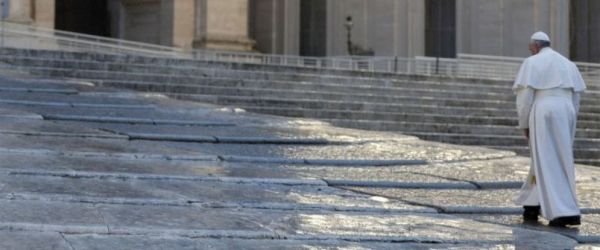Today’s Gospel takes us to the Upper Room to have us listen to some of the words that Jesus addressed to the disciples in the “farewell discourse” before his Passion. After washing the feet of the twelve [Apostles], he says to them: “A new commandment I give to you, that you love one another; even as I have loved you, that you also love one another” (Jn 13:34). But in what sense does Jesus call this commandment “new”? Because we know that already in the Old Testament, God had ordered members of his people to love their neighbour as themselves (cf. Lev 19:18). To those who asked him which was the greatest commandment of the Law, Jesus himself would reply that the first was to love God with all your heart and the second, to love your neighbour as yourself (cf. Mt 22:38-39).
What then, is the novelty of this commandment that Jesus entrusts to his disciples? Why does he call it a “new commandment”? The old commandment of love became new because it was made complete with this addition: “as I have loved you”, “love one another as I have loved you”. The novelty lies wholly in Jesus Christ’s love, with which he gave his life for us. It is God’s universal love, without any conditions or limits, which reaches its culmination on the cross. In that moment of extreme abasement, and in that moment of abandonment to the Father, the Son of God showed and gave to the world the fullness of love. Thinking back to Christ’s passion and agony, the disciples understood the meaning of his words: “As I have loved you, so you too must love one another”.
Jesus loved us first. He loved us despite our frailties, our limitations and our human weaknesses. It was he who ensured we become worthy of his boundless and never-ending love. By giving us this new commandment, he asks us to love one another, not only and not so much with our love, but with his, which the Holy Spirit instills in our hearts if we invoke him with faith. In this way — and only in this way — can we love one another not only as we love ourselves but as he loved us, that is, infinitely more. Indeed, God loves us much more than we love ourselves. And thus, we can spread everywhere the seed of love that renews relationships between people and opens horizons of hope. Jesus always opens horizons of hope. His love opens horizons of hope. This love makes us become new men, brothers and sisters in the Lord, and makes us the new People of God, that is the Church, in which everyone is called to love Christ and to love one another in him.
The love that was manifested in Christ’s Cross and that he calls us to live is the only force that transforms our hearts of stone into hearts of flesh; the only force capable of transforming our heart is Jesus’ love, if we too love with this love. And this love makes us capable of loving our enemies and forgiving those who have offended us. I will ask you a question; each of you can respond in your heart. Am I capable of loving my enemies? We all have people — whether ‘enemies’ I do not know — but who do not get along with us, who are on “the other side”; or some have people who have hurt them.... Am I capable of loving those people, that man, that woman who hurt me, who offended me? Am I capable of forgiving them? Each of you can respond in your heart. Jesus’ love shows us the other as a present or future member of the community of Jesus’ friends. It spurs us to dialogue and helps us to listen to one another and to mutually get to know each other. Love opens up toward the other, becoming the foundation of human relationships. It renders us capable of overcoming the barriers of our own weaknesses and prejudices. Jesus’ love within us creates bridges, teaches new paths, triggers the dynamism of fraternity. With her maternal intercession, may the Virgin Mary help us to receive from her son Jesus the gift of his commandment, and from the Holy Spirit, the strength to put it into practice in everyday life.
[Pope Francis, Regina Coeli 19 May 2019]












